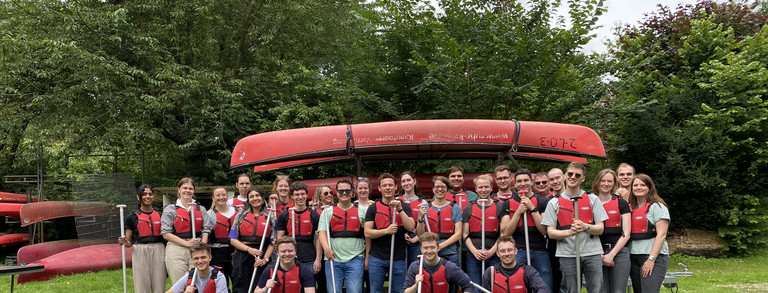Dr.-Ing. Karin Backhaus

Curriculum Vitae
Karin Backhaus finished her Biochemical Engineering studies at the TU Dortmund in January 2009 with her diploma thesis "Modelling and validation of butanol extraction with ionic liquids".
From April 2009 to August 2012, her research at the Laboratory of Process and Plant Design was on computer-aided bio-process synthesis.
Field of Research
An early evaluation of alternative downstream processing concepts is important for the economically successfull introduction of biotechnologically derived products. Proceeding systematically is hence indispensable to identify all applicable unit operations as well as their possible sequencing irrespective of the process engineers' individual experience and preferences. Bioprocess synthesis poses characteristic challenges in downstream process syntheses, such as low product concentration in multicomponent mixtures and specific separation processes. Additionally, information on product and mixture properties and mixture composition are often only qualitatively known or unknown. Expert knowledge from experience, captured in heuristics, provide valuable information for the reduction of the number of alternative processes in the prefield of experimentation, simulation and optimization.
The development of methods for the representation of heuristic knowledge and handling of qualitative and lacking information for efficient use in downstream process synthesis is in the focus of Karin Backhaus' research. First, a generally applicable guideline for downstream process synthesis for biotechnological products was developed. After its validation on model processes, it serves as a basis for the development of a webservice assisting downstream process synthesis.
Knowledge representation is done by means of ontologies. Ontologies are structured data for knowledge storage and exchange. Expert knowledge on downstream process synthesis for biotechnological products is saved class-based and connected via relations. Specific advantages of ontologies in the context of this field are their capability of handling qualitative information and reasoning based on partly incomplete information.
Currently, specification of separation tasks and, based on these information, identification of potentially advantageous process steps is possible. Current research is on detailing and enhancing the methodology, e.g. by implementing comparative evaluation means based on heuristic knowledge
Publications
Dissertation
- K. Backhaus
Representation of Expert knowledge on Biochemical Processes Design
TU Dortmund, 2014, Verlag Dr. Hut, München ISBN 978-3-8439-1904-3
Paper
- K. Backhaus, M. Lochmüller, M. C. Arndt, O Riechert, G. Schembecker
Knowledge-Based Conceptual Synthesis of Industrial-Scale Downstream Processes for Biochemical Products
Chemical Engineering Technology, 2015 38 (3), 537-546, doi.org/10.1002/ceat.201400111
Oral presentations
- Daniel Arndt, Karin Backhaus und Gerhard Schembecker
Abbildung verfahrensspezifischen Wissens für die Synthese von Downstream-Prozessen
8. Symposium „Informationstechnologien für Entwicklung und Produktion in der Verfahrenstechnik“, Frankfurt (2011)
- Karin Backhaus, Daniel Arndt und Gerhard Schembecker
Abbildung verfahrensspezifischen Wissens für die Synthese von Downstream-Prozessen biotechnologisch hergestellter Produkte
ProcessNet Jahrestagung 2010, 21.-23. September, Aachen
Poster presentations
- Karin Backhaus, Daniel Arndt, Robin Schulz, Gerhard Schembecker
Ontology-based chromatographic purification process selection
European Congress on Chemical Engineering (ECCE) 2011, 25.-29. September, Berlin



